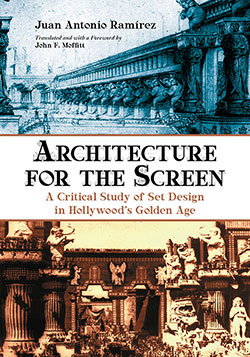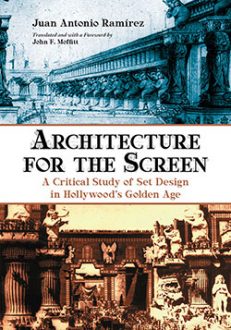Architecture for the Screen
A Critical Study of Set Design in Hollywood’s Golden Age
$29.95
In stock
About the Book
Most of us have never found ourselves trapped inside a burning skyscraper or entombed within an Egyptian pyramid—but we probably have some idea of what it would be like because of their portrayal on screen. The movies have overcome the constraints of time and place by bringing us images of diverse and otherwise unfamiliar settings.
This work covers the many applications of art and architecture appearing in the movies produced in Hollywood from the very beginning until the fifties. The first chapters deal with the process of design, construction, physical characteristics and immediate functions of a wide variety of architectural sets. The remaining chapters examine the great number of styles shown in those movies and take the reader up to the final triumph of modernist architecture in the aftermath of the Second World War.
About the Author(s)
Bibliographic Details
Juan Antonio Ramírez
Translated and with a Foreword by John F. Moffitt
Format: softcover (7 x 10)
Pages: 255
Bibliographic Info: 108 photos, notes, bibliography, index
Copyright Date: 2012 [2004]
pISBN: 978-0-7864-6930-7
eISBN: 978-0-7864-9191-9
Imprint: McFarland
Table of Contents
Foreword: Architecture in the Movies and Elsewhere in History ( John F. Moffitt) 1
Preface to the English Edition: Ten Lessons About Architecture in the Movies 5
Preface to the First Edition (1986) 11
1. General Introduction
Film Architecture and the Crisis of Modernism 13
From Shooting on Location to Filming in the Studios 16
The Architecture of Movie Theaters and Architecture in the Movies 21
Film Architecture vs. Ordinary Architecture 23
2. Set Design
The First Advances in Art Direction 26
Architect vs. Director: Joseph Urban 27
The “Illustrators”: Anton Grot and William Cameron Menzies 32
Stage Designers and Painters: Wilfred Buckland and Ben Carré 36
Supervising Architects: Hans Dreier, Van Nest Polglase, and Cedric Gibbons 38
Other Art Directors 42
The Design Process 43
Background Research 45
Additional Aspects of Design 49
The Imaginary Client and the Viewing Customer: Scale Models 49
Working Conditions and the Studio Styles 51
3. Set Construction
Techniques, Materials, and Architectural Machinery 54
Tricks of the Trade 59
The Impact of Sound 67
4. From Furniture to Artificial Landscapes
Set Dressing and the Accessories Departments 69
Wardrobes vs. Sets 72
The Construction of Landscapes 72
Artificial Oceans and Creative Ship-Building 76
Heavenly Effects 79
5. Architecture and Desire: The Character of Film Constructions
Six Distinctive Qualities 81
Color and Lighting 90
A Driving Functionalism 93
6. The Death and Resurrection of Sets
Methods of Destruction: Fire, Burial, Abandonment 97
The Ruins of Hollywood 101
Architectural Metempsychosis: The Permanent Sets 102
Some Statistics 109
7. Architectural Styles from Antiquity
Mesopotamia and Palestine 114
Egypt 122
Greco-Roman Architecture 127
8. From Medieval to Renaissance Architectural Styles
Castles and Palaces 132
The Gothic of Terror 135
Church, Cloister, Street… 141
Examples from the Renaissance 143
9. The Provinces of Exoticism
From Legendary Arabia to Contemporary Legend: Moorish Spain 146
An Archetypal Spain 151
India 153
Pan-Slavic Architecture and/or the Jungle 156
The Far East 157
Pre-Columbian America 160
10. From Colonial Baroque to Contemporary Eclecticism
The “Spanish Style” and the Bourgeois Baroque 162
Did a Cinematic Neo-Classicism Exist? 170
“American” Architecture, Frontier to Urban 171
Other (Old World) Countries 176
11. Modern Architecture Conquers Hollywood
The First Moderns: Urban, Rambova, et al. 179
Art Deco and Zigzag Geometrization 186
The Ocean Liner and “Streamline Moderne” 190
The International Style 194
Rationalist-Surrealist Architecture in Musicals 201
12. Epilogue
Some Omnipresent Elements: Staircases, Bathrooms, Bedrooms 206
Partial Conclusions 213
Notes 217
Bibliography 227
Index 241
Book Reviews & Awards
“fascinating…highly recommended”—Choice; “fascinating review of Hollywood set design”—C&RL News.





